Blue Heron Zen Solves Zoning Problems
Retains Seattle Home for Continued Training
Written by: Tom Campbell
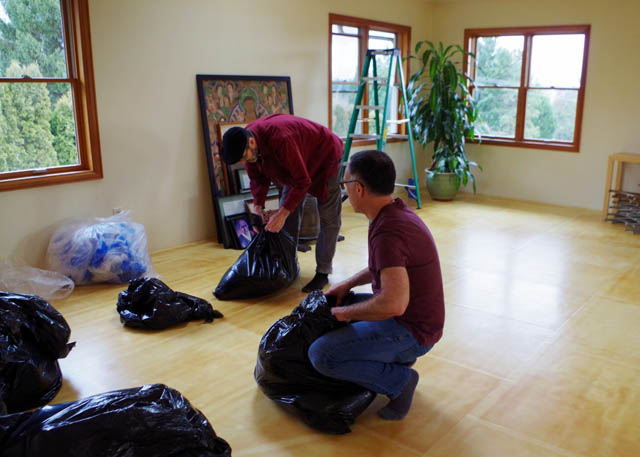
Senior dharma teacher Paul Gulick and dharma teacher Chris Chapman help reassemble the dharma room after the renovations.
Photos by Jill Erwin, Eric Nord
The Blue Heron Zen Community is located in a beautiful residential temple, with rice paper heated floors and views from the top of a hill in north Seattle.
Flying under the radar for the past 10 years, we were jolted into action when a neighbor complained about parking and the City of Seattle filed an enforcement notice.
Until then we had no idea we were not zoned properly, nor that that keeping our wonderful home in the city would require zoning changes and a building permit for major upgrades.
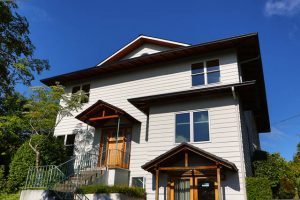
Outside view of Blue Heron Zen Community building, in north Seattle.
However after a three-year odyssey of rezoning and securing a building permit, we are now in the final stages of finishing our major remodeling project. We will now be completely legal, with the needed zoning for a religious facility in a residential zone.
We raised half the funds for the remodel from our members, the balance from a local bank that assisted with refinancing. Winning needed zoning and permits was essential to secure a bank loan, as was a stable financial position with strong membership.
Our members really stepped up to resolve zoning issues, to create parking around the facility, and to secure a building permit to address fire and handicap access codes. As abbot I negotiated throughout the permitting process and visited neighbors door-to-door, to tell them about the project.
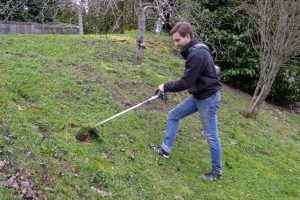
Nate Samuelson, like all residents, helps to maintain Blue Heron’s building and grounds.
Sangha members contributed funding and helped with work projects. The work was primarily to improve parking, access and protection from fire.
We added six more parking spaces for a total of nine on our property, and improved handicap access with a ramp, bathroom rails and improved walkability up the driveway.
Inside the building we enhanced fire safety protection, a big project that required us to close the center for a few weeks. Additionally we will be constructing a fire escape exit, directly across from the upstairs dharma room.
“Making these big changes in our dharma home has shown me, first of all, the incredible talent and dedication within our sangha,” said Zen Master Jeong Ji, lead dharma teacher of our center. “Also I think we really appreciate the importance of the space where dharma is practiced. People coming here for the first time can feel it right away.”
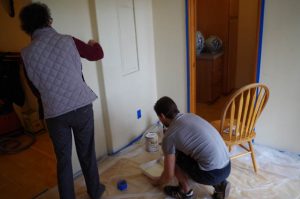
Zen Master Jeong Ji and Samuelson painting, as part of the renovations.
Like many dharma groups the Blue Heron Zen Community has utilized a variety of practice spaces over its 35 years, including members’ homes, churches, and borrowing other dharma rooms. We ended our wanderings in 2006, when we were able to purchase this remodeled home from a Korean Zen practitioner.
A key to Zen Buddhism is cultivation of consistent practice, with a sangha and teachers committed to long-term deeper training.
Blue Heron Zen is one of the few Zen centers in the Northwest offering residential training, which is part of why retaining our center has been so important.
This residential training is a key part of our Zen center, providing a unique opportunity to practice intensively within a community setting. Prospective residents have to determine whether they can make a commitment to our tradition of Zen training, and if they can make a longer-term commitment. You can view our guidelines here.
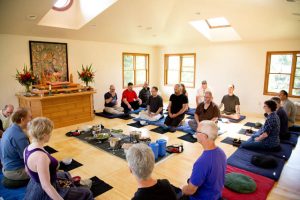
Zen practitioners take part in a formal lunch during a retreat.
Residential training is an opportunity for new or older students to more deeply investigate their true nature, through their interactions and relationships.
Some find residential training too difficult, especially living that closely with others. Others find it a wonderful opportunity and often want to stay a long time.
One student who had lived at the Zen Center for more than 10 years was reluctant to leave, but actually made greater life strides by being outside the shelter of the community. Because the Blue Heron facility only has five residential slots, the maximum training time is limited to four years.
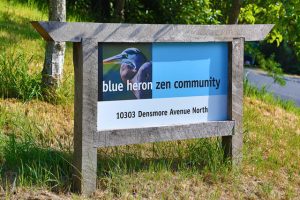
Entrance sign at Blue Heron Zen Community.
The heart of Zen training is the intimate connection between all beings. Through relationships and deeper investigation, we find our original home and true nature. This moment-to-moment awareness is greatly enhanced through having a beautiful facility, and through practicing with other committed students, residents and teachers.
Blue Heron also reaches out into the local community. Our sangha sponsors a regular social action day where we’ve done projects in the neighborhood. We’ve also participated in interfaith efforts, with the local Islamic mosque.
At a time of fast-rising Seattle housing prices, securing a long-term training space is a huge challenge for many dharma groups.
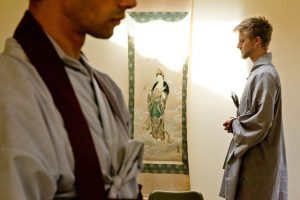
Dylan Simpson practicing walking meditation.
Fortunately, Seattle zoning codes are intended to be permissive for religious practice facilities. But complying with codes is expensive, because parking, handicap access, fire codes, and structural issues with buildings are difficult to retrofit.
Securing our dharma home is a great relief for members of the Blue Heron Zen Community. We hope others will come and visit us – or perhaps investigate a residency. We do rent our facility at minimal charge to other dharma groups. If you have questions or want support with your own regulatory issues, please contact us at info@blueheronzen.org.
